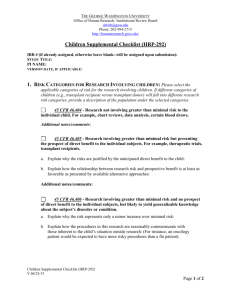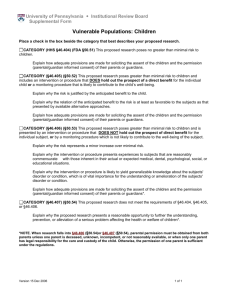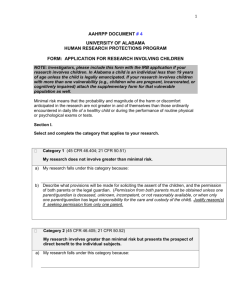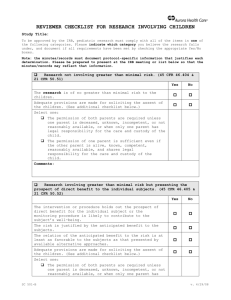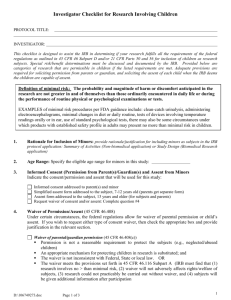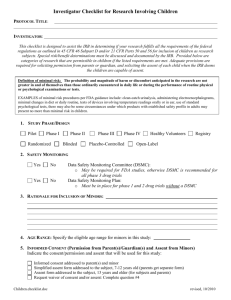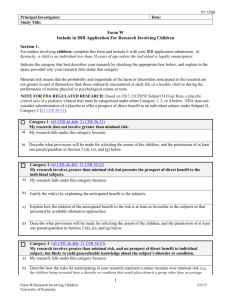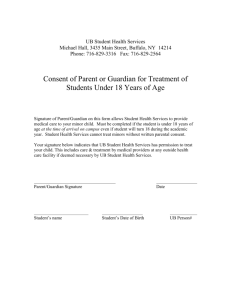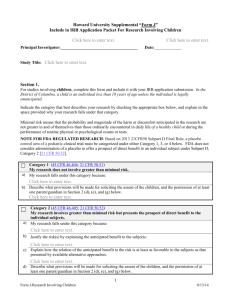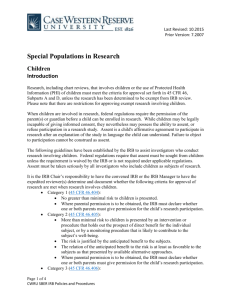Informed Consent
advertisement
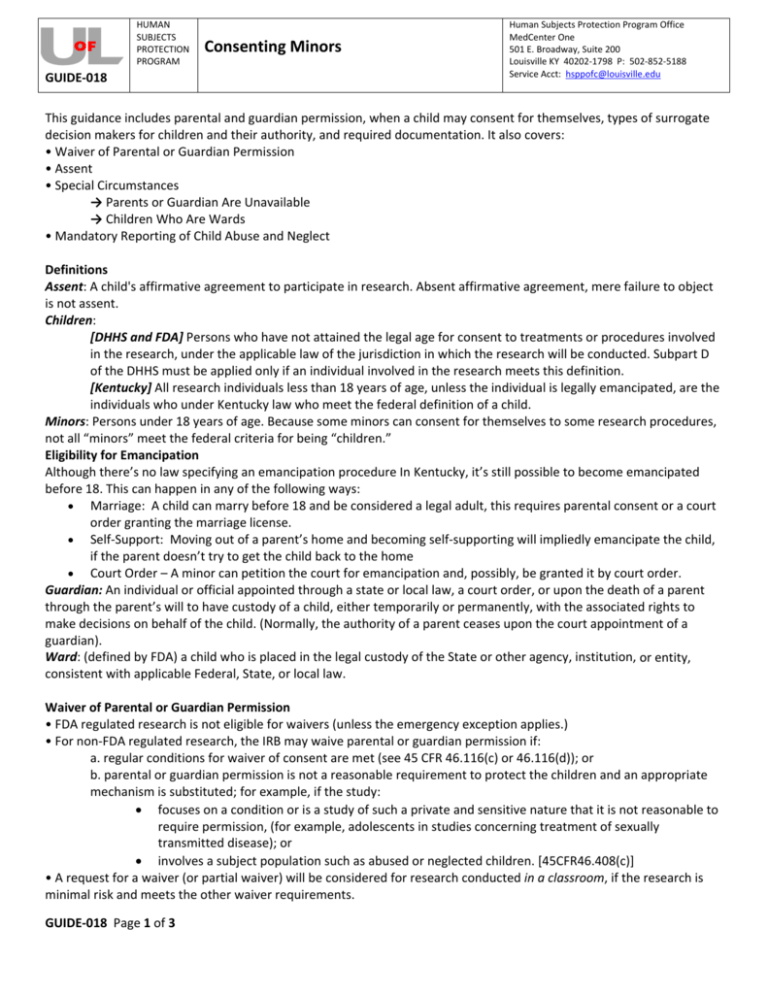
GUIDE‐018 HUMAN SUBJECTS PROTECTION PROGRAM Consenting Minors Human Subjects Protection Program Office MedCenter One 501 E. Broadway, Suite 200 Louisville KY 40202‐1798 P: 502‐852‐5188 Service Acct: hsppofc@louisville.edu This guidance includes parental and guardian permission, when a child may consent for themselves, types of surrogate decision makers for children and their authority, and required documentation. It also covers: • Waiver of Parental or Guardian Permission • Assent • Special Circumstances → Parents or Guardian Are Unavailable → Children Who Are Wards • Mandatory Reporting of Child Abuse and Neglect Definitions Assent: A child's affirmative agreement to participate in research. Absent affirmative agreement, mere failure to object is not assent. Children: [DHHS and FDA] Persons who have not attained the legal age for consent to treatments or procedures involved in the research, under the applicable law of the jurisdiction in which the research will be conducted. Subpart D of the DHHS must be applied only if an individual involved in the research meets this definition. [Kentucky] All research individuals less than 18 years of age, unless the individual is legally emancipated, are the individuals who under Kentucky law who meet the federal definition of a child. Minors: Persons under 18 years of age. Because some minors can consent for themselves to some research procedures, not all “minors” meet the federal criteria for being “children.” Eligibility for Emancipation Although there’s no law specifying an emancipation procedure In Kentucky, it’s still possible to become emancipated before 18. This can happen in any of the following ways: Marriage: A child can marry before 18 and be considered a legal adult, this requires parental consent or a court order granting the marriage license. Self‐Support: Moving out of a parent’s home and becoming self‐supporting will impliedly emancipate the child, if the parent doesn’t try to get the child back to the home Court Order – A minor can petition the court for emancipation and, possibly, be granted it by court order. Guardian: An individual or official appointed through a state or local law, a court order, or upon the death of a parent through the parent’s will to have custody of a child, either temporarily or permanently, with the associated rights to make decisions on behalf of the child. (Normally, the authority of a parent ceases upon the court appointment of a guardian). Ward: (defined by FDA) a child who is placed in the legal custody of the State or other agency, institution, or entity, consistent with applicable Federal, State, or local law. Waiver of Parental or Guardian Permission • FDA regulated research is not eligible for waivers (unless the emergency exception applies.) • For non‐FDA regulated research, the IRB may waive parental or guardian permission if: a. regular conditions for waiver of consent are met (see 45 CFR 46.116(c) or 46.116(d)); or b. parental or guardian permission is not a reasonable requirement to protect the children and an appropriate mechanism is substituted; for example, if the study: focuses on a condition or is a study of such a private and sensitive nature that it is not reasonable to require permission, (for example, adolescents in studies concerning treatment of sexually transmitted disease); or involves a subject population such as abused or neglected children. [45CFR46.408(c)] • A request for a waiver (or partial waiver) will be considered for research conducted in a classroom, if the research is minimal risk and meets the other waiver requirements. GUIDE‐018 Page 1 of 3 GUIDE‐018 HUMAN SUBJECTS PROTECTION PROGRAM Consenting Minors Human Subjects Protection Program Office MedCenter One 501 E. Broadway, Suite 200 Louisville KY 40202‐1798 P: 502‐852‐5188 Service Acct: hsppofc@louisville.edu • Research is generally not suitable for a waiver if it involves: parental political affiliations or beliefs, mental or psychological problems, sexual behavior or attitudes, illegal/antisocial/self‐incriminating behavior, appraisals of other individuals with whom the minor has a familial relationship, relationships legally recognized as privileged (lawyers, doctors, clergy), or religious affiliations or beliefs. Assent The IRB must determine whether researchers have adequate provisions to solicit assent, when the children are capable of providing it. The researcher must inform the IRB how the affirmative assent of the child will be documented, e.g., by signature on assent form, documented by the researcher, or other. In Kentucky, a researcher for an experimental drug study must normally obtain the assent of any child participant 7 years or older. For studies involving children 7 to 17 years, the IRB recommends that researchers document the child's willingness to participate with a signed assent document. A child’s capacity to assent must be evaluated on an individual basis. Assent Document Should include any information that can affect a child’s decision to participate – an explanation of the proposed research procedures (procedures that are not part of the child's care should be described as optional), the research purpose, and any discomforts. Should use language that is geared to the cognitive level of participating children. The language used in the parental consent document might also be suitable for an older teen. Might more appropriately be obtained orally (omission of signature) for younger children (younger than 7 years but old enough to be consulted about participating in research). See Assent Form Template on the Human Subjects Research website. Assent Not Required or Waived At the request of a researcher, the IRB may determine no assent is required in one or more of the following circumstances (including FDA regulated protocols): Children are not capable of assenting, after taking into account the ages, maturity, and psychological state of the children involved, either for all the children or for each child. Intervention or procedure involved in the research holds out a prospect of direct benefit that is important to the health or well‐being of the children and is available only in the context of the research. Customary conditions for waiver or alteration of consent are satisfied (45 CFR 116 or 21 CFR 50.55(d)). Special Circumstances: 1) Parents or Guardian Are Unavailable Generally, a researcher may not involve a child in research if the parent(s) or guardian is not available to provide permission and the IRB has not waived parental or guardian permission. 2) Children Who Are Wards • Laws limit research with children who are “wards” of the State or other agency, institution or entity. • The IRB may approve a protocol that involves wards and research involving greater than minimal risk with no prospect of direct benefit to participants (under 45 CFR 46.406 or 21CFR 50.53) or not otherwise approvable which presents an opportunity to understand, prevent, or alleviate a serious problem affecting the health or welfare of children (under 45 CFR 46.407 or 21 CFR 50.54) only if the study is: 1) related to their status as wards, or 2) conducted in schools, camps, hospitals, institutions, or similar settings in which the majority of the participating children are not wards. GUIDE‐018 Page 2 of 3 GUIDE‐018 HUMAN SUBJECTS PROTECTION PROGRAM Consenting Minors Human Subjects Protection Program Office MedCenter One 501 E. Broadway, Suite 200 Louisville KY 40202‐1798 P: 502‐852‐5188 Service Acct: hsppofc@louisville.edu If the research is approved under the above conditions, the IRB shall require appointment of an advocate for each child who is a ward, in addition to any other individual acting on behalf of the child as guardian or in loco parentis. One individual may serve as advocate for more than one child in a study. Note: The above does not apply for research approved under 46.404 or 405, 50.51 or 52. Who may be an advocate? An advocate: i) has the background and experience to act in (and agrees to act in) the best interest of the child for the duration of the research, and ii) is not associated in any way with the research (except as an advocate, or member of the IRB), the researchers, or any guardian association. Researchers are responsible for: i) informing the IRB when the study intends to include children who are wards; and ii) compliance with any relevant requirements of the competent court, agency, institution, or entity of which the child is a ward. For research involving medical care for wards of a court, an order from the judge is often required, in addition to permission from the person charged with the care of the child. Mandatory Reporting of Child Abuse and Neglect Under Kentucky law, health practitioners and educators are required to report to appropriate authorities when there is good reason to believe that a child or an adult has been abused. They are required to also report an injury that indicates possible abuse of an adult or dependent child or if they have personally seen a child or adult with injuries from an apparent assault. Investigators are reminded that state law periodically changes, and does vary from state to state. Investigators conducting research outside of Kentucky should be familiar with the applicable reporting requirements of the state or country where the research is to take place. Child Abuse KRS 620.030 : “Any person, including but not limited to a physician, osteopathic physician, nurse, teacher, school personnel, social worker, coroner, medical examiner, child‐caring personnel, resident, intern, chiropractor, dentist, optometrist, emergency medical technician, paramedic, health professional, mental health professional, peace officer or any organization or agency for any of the above, who knows or has reasonable cause to believe that a child is dependent, neglected or abused, regardless of whether the person believed to have caused the dependency, neglect or abuse is a parent, guardian, person exercising custodial control or supervision or another person, or who has attended such child as a part of his professional duties shall, if requested, in addition to the report required in subsection (1) of this section, file with the local law enforcement agency or the Kentucky State Police or the Commonwealth's or county attorney, the cabinet or its designated representative within forty‐eight (48) hours of the original report a written report containing: 1. The names and addresses of the child and his parents or other persons exercising custodial control or supervision; 2. The child's age; 3. The nature and extent of the child's alleged dependency, neglect or abuse (including any previous charges of dependency, neglect or abuse) to this child or his siblings; 4. The name and address of the person allegedly responsible for the abuse or neglect; and 5. Any other information that the person making the report believes may be helpful in the furtherance of the purpose of this section.” • 21 CFR 50 Subpart D Additional Safeguards for Children in Clinical Investigations • 21 CFR 50.55(d) Waiver or alteration of consent OHRP • 45 CFR 46 Subpart D Additional Protections for Children Involved as Subjects in Research • 45 CFR 46.116(c) or 46.116(d) General requirements for informed consent. • 45 CFR 46.408(c) Requirements for permission by parents or guardians and for assent by children • Children Involved as Subjects in Research: Guidance on HHS 45 CFR 46.407 ("407") Review Process GUIDE‐018 Page 3 of 3
